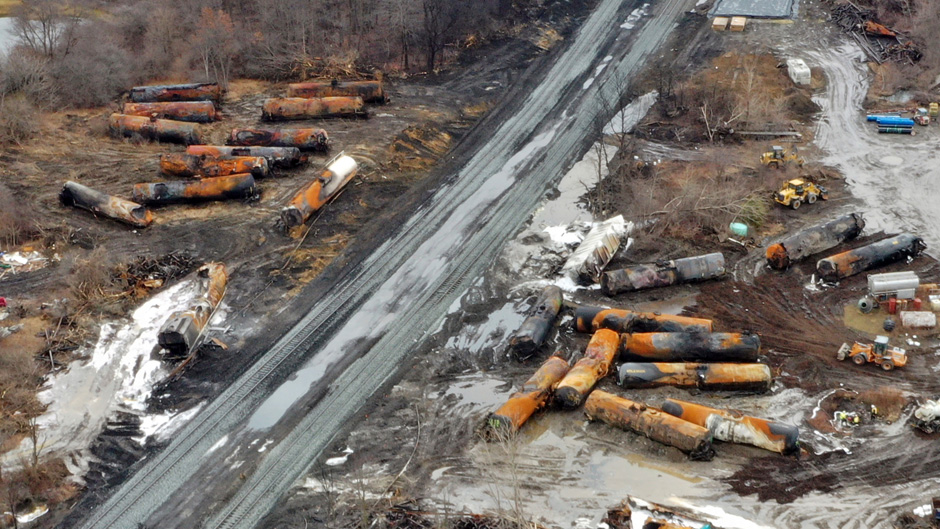Authorities lifted evacuation orders about a week after a train derailment that resulted in a toxic chemical spill, giving residents of East Palestine, Ohio, the green light to return to their homes and telling them that the air was safe to breathe and the water supply untainted.
But for the nearly 5,000 inhabitants of this small village on the border with Pennsylvania, those assurances have done little to allay their fears of a long-term environmental and health disaster after 38 cars of a Norfolk Southern Railroad train, some carrying hazardous chemicals, derailed Feb. 3 near their city, sending flames high into the night sky.
Five of the derailed cars carried vinyl chloride, a highly volatile, colorless gas used to make polyvinyl chloride, or PVC, a type of plastic. The gas is a known human carcinogen and has been linked to an increased risk of a rare form of liver cancer called hepatic angiosarcoma. Fearing a major explosion, crews performed a controlled release of the toxic chemicals from those five cars.
As a result, East Palestine residents are concerned about hazardous gases that may be lingering in the air.
“I would be concerned about its immediate effects more than its long-term effects,” said Carl D. Hoff, a professor of chemistry in the University of Miami College of Arts and Sciences. “Almost all organochlorine compounds are toxic. Even after decomposition, it may leave residues that are longer lasting but less dramatic in their danger. The monomeric compound is a real hazard but should diminish with time in my view.”
He cited a published Environmental Protection Agency report that indicates that vinyl chloride will rapidly exchange with soil and water and air and be destroyed by sunlight with a half-life of a day and a half.
Still, monitoring of the water and soil in the area will be critical, according to Naresh Kumar, a professor of environmental health at the Miller School of Medicine. “And I am sure that is something they will do for weeks and potentially months in the future,” he said.
For some animals in the area, the derailment, which is under investigation by the National Transportation Safety Board, might have already had a deadly impact. The Ohio Department of Natural Resources, for example, has reported that the chemical spill has killed about 3,500 small fish across seven and a half miles of streams. What’s more, a resident who lives 10 miles from East Palestine reported to a local TV station that her five hens and rooster had perished.
As such, residents are concerned about long-term impacts to their health, especially now with a report that reveals more toxic chemicals were aboard the train that derailed. Some residents worried about health risks already have filed a federal lawsuit, noted Abigail Fleming, practitioner in residence at the School of Law’s Environmental Justice Clinic.
“I am sure advocates will be looking into a variety of claims related to personal injury. And injuries could include exposure to toxic chemicals, burns, lacerations, and displacement of residents,” Fleming said. “Residents will most likely seek medical monitoring as part of any suit, and advocates and activists will also most likely investigate claims related to the contamination of the air and waterways.”
If anything, the derailment and resulting chemical spill are another wake-up call for the nation to ramp up the safety of its transportation infrastructure—specifically, the nature in which hazardous cargo is shipped, according to Hoff.
“It is something we have to start paying closer attention to,” he said. “We must minimize those risks and not give terrorists easy targets to attack. A solid transportation grid is more important than 5G for rural communities.”

